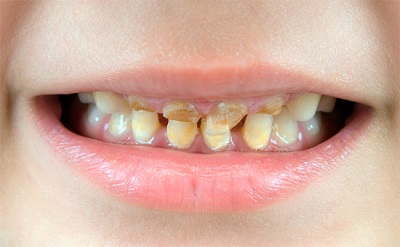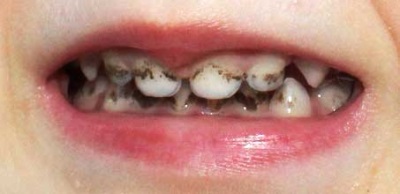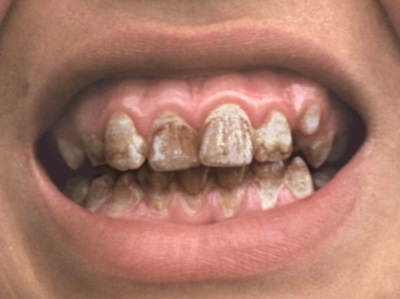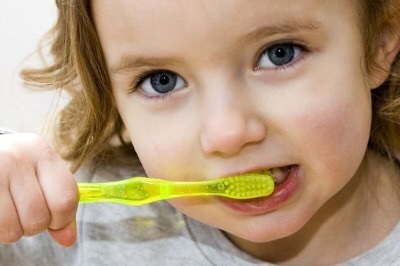Brown plaque on the teeth of a child
As soon as a child begins to erupt teeth, they are affected by various factors, which causes the appearance of yellowish bloom. This is an accumulation of food particles and mucosal cells in all babies, in which bacteria begin to develop. By removing such plaque on time, you can prevent dental disease.

This situation is the norm, but what if the plaque on children's teeth changed color and turned brown? Is it necessary to do something if brown spots are found in the crumbs and as evidenced by the brown spots that appeared on the teeth of infants?
The reasons
The appearance of brown bloom on children's teeth is often caused by:
- Caries This is the main cause of brown spots on the teeth of children. Its development is promoted by insufficient quality teeth cleaning, metabolic disturbances, poor nutrition of the child, heredity, chewing on one side, insufficient salivation, impaired bite and other factors. The initial stage of the disease is represented by imperceptible white spots, and when the color of the enamel turns brown, this indicates a more profound damage to the enamel, and sometimes dentin.
- Acceptance of iron. If a child has anemia and he has been prescribed iron-containing medications, then the darkening of the teeth is most likely caused by just such treatment. As soon as the course of drugs is completed, the color of the tooth enamel is normalized.
- By staining plaque with drink or food stains. This situation is possible after drinking tea, beets, carrots, berries, cocoa and other products with pigments. Eliminate the brown color in this case will help ordinary cleaning.
In the next video, a pediatric dentist will talk about why children get caries and how important it is to start treatment as soon as possible.
Why can even teeth turn yellow in a one year old child?
If a child under 2 years old has brown spots on his teeth, this may be a sign of caries in the bottle. So called the form of the disease, which leads to the appearance of long-term feeding of children from a bottle. Especially often this caries appears in babies who are not given to drink water at night, but something sweet — juice, fruit juice, tea.
Since the enamel in one-year-olds is still not very strong, and the sweet food is a good environment for the development of bacteria, caries develops quite quickly. And therefore, when detecting brown plaque on the teeth of infants, it is important as soon as possible to go with a crumb to the doctor.
Treatment
The problem of brown bloom requires a visit to the dental office. It is impossible to ignore such changes, considering that milk teeth will soon change to permanent ones and it is not important to treat them. Untreated caries will penetrate deeper, cause pain in the teeth and may even lead to tooth loss, as a result of which permanent teeth may also become infected or grow crooked.
In the treatment of children using different methods depending on the spread of infection. Sometimes it is only enough to process the enamel with brown spots with special solutions with silver or fluorine.This will prevent further destruction of the teeth and allow them to wait for their physiological change. If the infection has penetrated deeply, the tooth will have to be drilled and filled.
Prevention
To prevent the appearance of brown plaque will help such measures:
- Start brushing baby teeth from the time of their eruption.
- Refusal of food through the bottle after the first tooth appeared.
- Refusing a sweet drink at night.
- Daily teeth cleaning in the morning after waking up, and also before bedtime.
- Inclusion in the child's diet of solid fruits and vegetables for natural cleaning of the teeth during chewing.
- Moistening the air in the baby’s room, preventing saliva from drying out.
- Timely treatment of rhinitis, precluding prolonged mouth breathing.
- Regular visits to the dentist at least 1-2 times a year.













